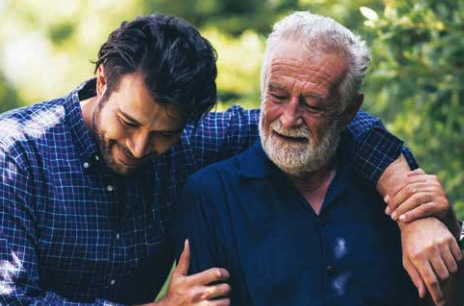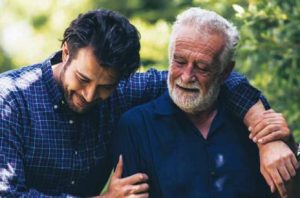...still family-owned.
The Amazing Power of STORY
It was Søren Kierkegaard who wisely noted, “Life can only be understood backwards, but it must be lived forwards.”
As the 25th anniversary of the death of my father approaches, I have found myself instinctively going backward. Backward to the days just prior to his death when I had the honour of holding space for him as he prepared to make his transition.
My father recognized in his head and heart that his days on this earth were limited. Rest did not come easy, but his need to “story” did.
His love of family flowed out of stories from his childhood. He told me how his mother inspired his love of baseball. He told me how his father wasn’t very emotionally or physically available to him as he grew from childhood to adolescence. He told me of his deep love for his older brothers and sisters.
In the midst of my awareness that I would soon not have my father in my life, I listened, and I learned. I affirmed that his love for me was true and abiding. I learned of his fears about my mother, who would survive him. I learned what I already knew—that my father was a great man, a loving husband, and a wonderful father.
I also learned about the awesome power of “telling the story.” As he shifted from topic to topic, he didn’t need me to get in the way. As he at times struggled with a specific detail of a long-ago memory, he didn’t need me to get in the way. As he was brought to tears with his love-filled memories of life and living, he didn’t need me to get in the way.
As I reflect on my all-night vigil of honouring his story, I recall being humbled by the remarkable importance of how “story telling” brings meaning and purpose to our life and death experiences. For, you see, I’m a grief counsellor, and I commit much of my life to honouring stories. Stories of love and loss. Stories of pain and joy. Stories of hopes fulfilled, and dreams lost.
Thanks to my loving father and his need to tell his story, I have been able to reflect on the many reasons I’m proud to be a death educator and grief counsellor. By listening to the stories of others, I am honoured to be helping them:
- Search for wholeness among their fractured parts
- Come to know who they are in new and unexpected ways
- Explore how love experienced and love lost have influenced their time on this earth
- Discover how a life without story is like a book without pages—nice to see but lacking in substance
- Seek forgiveness and be humbled by their mortality
- Journey inward to discover connections previously not understood or acknowledged
- Create an awareness of how the past interfaces with the present and how the present ebbs back into the past
- Discover that the route to healing lies not in the physical realm but in the emotional and spiritual realms
- Come to understand that as they acknowledge their mortality, there is an enhanced awareness of the preciousness of each day.
When we are in mourning, we heal ourselves as we tell the tale. This is the awesome power of the story. Yet, in our fast-paced, efficiency-based culture, which often lacks an understanding of the role of hurt in healing, many do not understand the value of storying. Honouring stories requires that we slow down, turn inward, and embrace our own and others’ pain.
Listening to stories filled with sadness and grief is often not tolerated in a culture that collectively avoids these emotions whenever possible. Still, the need to tell the story and have it heard prevails.
Honouring my father’s story 25 years ago provided both of us a sacred moment in time. Toward the end of the opportunity to hold space for my father, he said, “Thank you for listening and thank you for being my son.” Oh yes, the awesome power of the story!
What a privilege to recall how my father reminded me not only of his love for me and his family, but how all of us need to stop, to listen, and to honour stories about life and death.
Dad, thanks for making me proud to be a death educator and grief counsellor and hopefully a compassionate companion to my fellow human beings. But most of all, thanks for making me proud to be your son.
When we are in mourning, we heal ourselves as we tell the tale. This is the awesome power of the story.
About the Author
Alan Wolfelt has been recognized as one of the World’s leading death educators and grief counsellors. His books have sold more than a million copies worldwide and have been translated into many languages. Dr Wolfelt founded the Centre for Loss & Life Transition in 1984 to offer education and support to both grievers and bereavement caregivers. He is known around the world for his compassionate messages of hope and healing, as well as his “companioning” philosophy of grief care.
Here in Australia, he is a consultant to Alex Gow Funerals and advises on matters of grief counselling.






